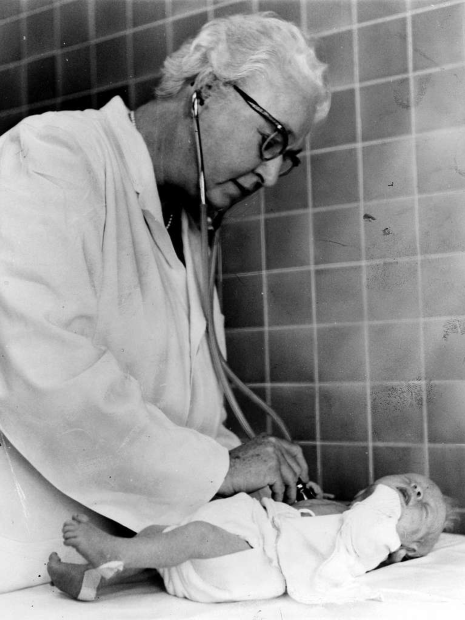Community Impact
Decades later, pioneering female physician’s newborn evaluation method is still saving infants’ lives
March 13, 2024
Home > About > News & Media > Story Center

Photo courtesy of the United States Library of Congress's Prints and Photographs division
Moments after a baby comes into the world, clinical workers assess five critical components– breathing, tone, reflexes, motion and heartrate. It’s an automatic, essential part of assessing a newborn’s health, but did you know it was invented by someone?
That inventor was Virgina Apgar, a pioneering female physician who was a leader in anesthesiology and teratology – the study of birth defects. She brought the evaluation process, known as the APGAR Score, into practice in 1952 and it’s been used by healthcare providers worldwide ever since.
The acronym has a meaning beyond the creator’s last name – A: Appearance, P: Pulse, G: Grimace, A: Activity and R: Respiration. The score rates each of these components from 0-10. The higher the score, the healthier the baby is determined to be.
“APGAR is a clinical assessment versus a diagnostic or lab – it drives practice back to honing physical assessment skills. This has held on as a fundamental aspect of newborn transitional care and speaks to the baby’s status,” explained Rachael Waas Shull, clinical nurse educator at Randall Children’s Hospital.
“It’s a great communication tool in working with a larger team to really zero in on what efforts need to be made where.”
“After one minute, APGAR tells us how this baby tolerated labor and the birthing process. At five minutes, APGAR tells us how well we responded to what that baby needed following birth. The APGAR scores may continue beyond the 5-minute mark if the baby is having a difficult time making that transition. They will continue until the baby is clinically doing well and receiving the support they need.”
Scores of seven and above generally indicate a baby is responding well to birth. A low score may mean medical intervention is needed in the moment but doesn’t necessarily indicate a long-term health issue.
“The APGAR score can tell us a lot about how a baby transitions to life outside of the womb and their birth story,” said Sarah Fulkerson, NICU clinical nurse educator at Randall Children’s Hospital.
APGAR relies on good clinical skills, Waas Shull added. “It invites collaboration and conversation within a medical team. I love that we still use it.”
Want to learn more about Virginia Apgar and her life? Check out her bio from Changing the Face of Medicine: Celebrating America’s Women Physicians.

